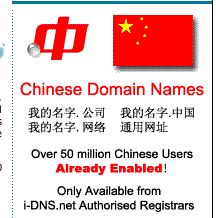Winston Chai at CNET explains the current state of internationalized domain names (IDNs) and why China may play a forceful role in pushing companies like Microsoft to begin supporting them.
Briefly, the domain name system (DNS) currently only supports a subset of the ASCII character set, which is of little use to speakers of Chinese, Japanese, Arabic, Hindi, etc. There are a number of hacks available to work around the ASCII limitation, but ultimately the DNS must be upgraded to support Unicode, the mother of all character sets. This is no trivial feat.
Can’t wait for Unicode? I-DNS provides a non-Latin domain name workaround

Progress is being made. The universal resource identifier (URI) is going to give way to the internationalized resource identified (IRI), now working its way through the standards process. And thanks to increasing pressure from China, the 600 pound emerging market, I believe that Microsoft will support IRIs and whatever else it takes to make non-English URLs a way of life. And if the folks at Microsoft drag their heels, I’ll bet the folks at Firefox may beat them in this race as well.
Internationalized domain names is one of these issues that rarely gets much press because it’s complcated, messy and not all that glamorous. Yet it is arguably the last remaining obstacle to creating a world wide web that is truly world wide.
